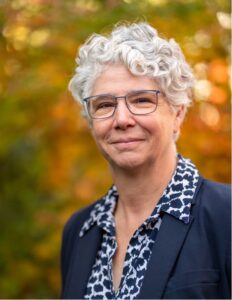
Cassandra Moseley’s career has always been shaped by a desire to find solutions to complex problems.
She was a graduate student at Yale when the quest to save the spotted owl – and the ensuing Northwest Forest Plan – dominated headlines, providing firsthand lessons about the value of collaboration among federal and local partners.
“Looking at the aftermath of the Northwest Forest Plan gave me opportunities to start thinking about collaborative approaches to federal natural resource management and how we can care for our land while creating rural economic opportunity,” Moseley said.
Moseley intends to carry this passion for collaboration into her new role as the vice president for research at Colorado State University, where she will oversee the institution’s nearly $500 million sponsored projects portfolio and work with leaders across virtually every discipline to advance CSU’s already internationally recognized reputation.
“Research for me is about having an impact and doing work that can make a tangible difference in the world,” Moseley said. “CSU is already doing that, and I’m excited to be a part of it.”
CSU President Amy Parsons added: “With Dr. Moseley’s strategic leadership and outstanding track record of campus collaboration, we can look forward to the continued expansion of CSU’s research portfolio and the advancement of the university as a top-tier research institution.”
Using research to foster collaboration
Before her career took her to Fort Collins, Moseley spent more than 20 years working in various roles at the University of Oregon, serving as everything from the institution’s chief research officer to a professor in the Institute for Resilient Communities, Organizations and Environments.
Here, she had the opportunity to study the changing face of wildfire management in the West – and particularly, how natural resource policies impact rural communities. Moseley said one of her proudest moments involved finding a solution to a problem that might sound familiar even to someone who doesn’t work in forestry.
“One of the first projects I worked on after graduate school was inspired by watching a forest worker organization and a rural community organization try to improve job quality for forest workers, and they were sort of fighting over who had the worst job,” she said. “And then, I realized that conducting research that would provide information about jobs in the woods could contribute to the conversation and make it easier for people to not fight amongst themselves but work together and make the positive changes that they’re both striving for.”
Making sure that people work together is a universal problem across virtually every industry. During her time in Oregon, Moseley teamed up with CSU Professor Courtney Schultz to study how different organizations can collaborate to tackle wildfires.
Schultz credits Moseley, who has testified before Congress and the Oregon State Legislature multiple times, with helping her develop the skills she needed to begin to do the same.
“Cass is very skilled and experienced at bringing scientific research to policymakers,” Schultz said. “She taught me how to do this on our first project together and provided me with valuable insight about how to present scientific research in a non-partisan and credible way to members of Congress, agency and NGO leaders.”
Tony Cheng, a professor in the CSU Department of Forest and Rangeland Stewardship and the director of the Colorado Forest Restoration Institute, has known Moseley for more than two decades. Referring to her as one of the most selfless people he knows, he said he’s excited Moseley is adding her wealth of knowledge to CSU’s already robust expertise in wildlife research.
“I think Cass has done amazing work in ensuring that rural America – especially communities tied to forest lands and economies – have a voice,” he said. “What I admire most about Cass is her ability to really think deeply around an issue, bring the right people together and develop strategies.”
Research as a catalyst for democracy
Moseley said she was drawn to CSU because of the work it already does in solving problems, be it through renewable energy research or advancements in human health.
“I’m excited about the ways in which CSU’s researchers are making a difference – and they are doing so across a wide spectrum of subjects,” Moseley said.
She said one of the key roles of a land-grant research institution like CSU is providing reliable, timely and relevant information – something that’s particularly important in this politically polarized age and as the university focuses on healthy dialogue as part of the Thematic Year of Democracy.
“There are so many people contributing to vital national and global conversations by providing new discoveries and knowledge, sometimes sharing ideas that challenge conventional wisdoms and bringing in new perspectives,” Moseley said.
In the coming months, Moseley said she’s excited to become more acquainted with the CSU community – as well as to kayak and explore the myriad of hiking trails surrounding Fort Collins.
“I’m a collaborative person, and I like to bring people together to find solutions and solve problems,” Moseley said. “It might take me a while, but I look forward to meeting as many people as I can.”